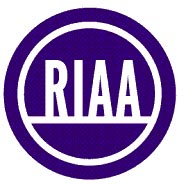RIAA Press Release, October 9, 1998
Washington, October 9, 1998 — In a move to protect the creative content of the music industry, the Recording Industry Association of America (RIAA), joined by the Alliance of Artists and Recording Companies, has filed a complaint against San Jose-based Diamond Multimedia. The RIAA charges that Diamond’s portable MP3 recording device, Rio, violates the Audio Home Recording Act (AHRA), and in doing so, encourages consumers to infringe the rights of artists by trafficking in unlicensed music recordings on the Internet.
The RIAA is seeking a preliminary and permanent injunction enjoining the sale or distribution of Rio (which is expected to be available in stores in late October) unless it complies with the AHRA. This morning, the RIAA filed a temporary restraining order to stop the distribution of the product until the Court can hear a motion for a preliminary injunction. The complaint was filed in the Federal District Court for the Central District of California.
“The RIAA strongly supports the development of new technology as it exposes music to a wider audience and changes the way consumers interact with the music they love,” said Hilary Rosen, president and CEO of the RIAA. “Technology must respect creative works. It is the mission of the RIAA to ensure that as new technologies become part of consumers’ everyday lives, copyright protection keeps pace.”
In the past few years, the recording industry has seen the proliferation of illegal MP3 sites on the Internet. Without the consent of recording artists, these sites make full-length music recordings available for free downloads – a practice that is an illegal activity, as well as a blatant infringement of artists’ rights.
In response, the RIAA has been working diligently to shut down infringing Internet sites that illegally traffic in copyrighted music. In one afternoon alone, the RIAA uncovered as many as 80 MP3 sites containing a total of more than 20,000 MP3 files, virtually all of which were unlicensed music recordings of America’s favorite artists.
The RIAA has been concerned about the recent development of MP3 portable recording devices because they capitalize on and are likely to exacerbate the problem of illegal MP3 music files. It seems doubtful that there would be a market for MP3 recording devices but for the thousands and thousands of illicit songs on the Internet.
Under the 1992 Audio Home Recording Act, the manufacturers, importers and distributors of digital audio recording devices receive a limited immunity from liability for copyright infringement. In exchange, manufacturers are required to do two things: First, they must pay a modest royalty to partially compensate the artists, composers, musicians, publishers and record companies who are affected by unauthorized copying. Second, they are required to incorporate into their devices a Serial Copyright Management System (SCMS) to prevent the unauthorized making of second-generation copies.
MP3 recording devices are governed by this law, and are clearly in violation of it. The Rio does not comply with the Audio Home Recording Act because it is not registered with the Copyright Office; it does not pay royalties; and it does not incorporate SCMS, which prevents serial copying. These are all requirements of the AHRA.
The AHRA covers a device “which is designed or marketed for the primary purpose of, and that is capable of, making a digital audio copied recording for private use.” Rio reproduces MP3 music files from a computer hard drive to the memory of the MP3 recorder. This is the primary purpose for which it was designed and is marketed. Its marketing material confirms that it is directed at music-related uses.
“It was our hope that Diamond Multimedia would be an active participant in working with us to develop a solution that adheres to the law and protects the fundamental rights of all artists,” said Rosen. “To our disappointment, Diamond declined to postpone its product launch so that we could constructively address the issues, leaving us with no other option than to take legal action to prevent distribution of these devices. It’s a rare occasion that we have to take measures of this nature. Inter-industry dialogue would be much more productive.”
“It is the RIAA’s goal to add to the richness of the music listening experience and enable generations of listeners to access music’s fantastic breadth and depth. Promoting a product that encourages piracy on the net hurts everyone interested in a legitimate online music marketplace. As e-commerce becomes a reality for more and more people, the RIAA will be there to ensure that copyright protection keeps pace. This commitment to all music stakeholders will guarantee diversity and creativity for the music lovers of tomorrow.”
The RIAA is a trade association whose members create, manufacture and/or distribute approximately 90 percent of all legitimate sound recordings produced and sold in the United States.
Update: Court Decision On Diamond Multimedia’s Rio
Contacts:
RIAA, Alexandra Walsh – (202) 775-0101
awalsh[at]riaa.com
The Weber Group, Laureen McGowan – (617) 520-7087
lmcgowan[at]webergroup.com

